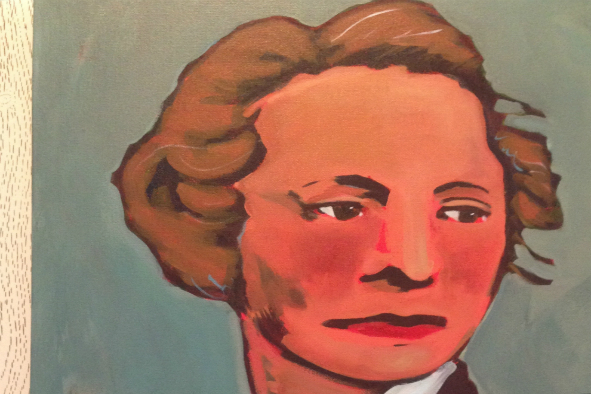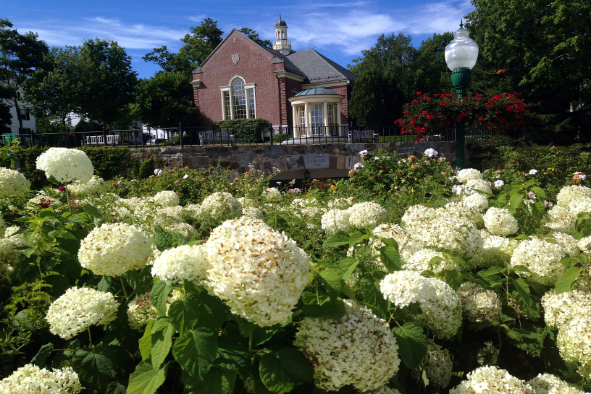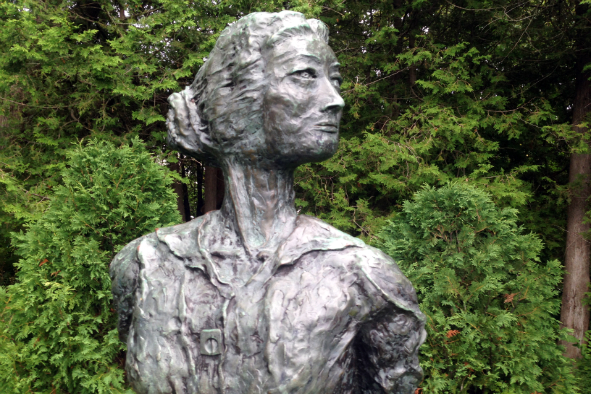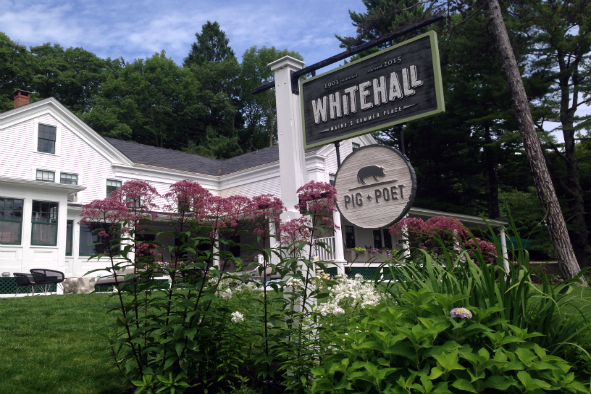Embrace the outdoors in the Mid-Coast Maine town where writer and poet Edna St. Vincent Millay experienced her literary breakout. Camden offers hills to climb, with the reward of lying on sunbaked ledges and gazing at the horizon just like the Pulitzer Prize winner did. Back at sea level, take in the charming village green where you’ll find a seven-foot tall statue of Millay forever gazing out into the harbor.

The view of Camden from the top of Mount Battie (Photo: Dave Hensley via Flickr)
“PLEASE ASK FRONT DESK BEFORE PLAYING” reads the sign on the 1901 Steinway in the front lobby of the Whitehall Inn in Camden, Maine. The need to ask for permission seems at odds with the independent spirit of a local 19-year-old woman who sat at this very piano one night in August 1912 to recite her poetry.
That was the night Edna St. Vincent Millay’s exquisite verse captivated a wealthy arts patron who happened to overhear her recitation of her poem “Renascence” and ultimately paid for the young poet’s way through Vassar College in Poughkeepsie, New York. The Class of 1917 Vassar yearbook opened to Millay’s photo rests on a shelf inside a cabinet along with her 1909 diploma from the now defunct Camden High School. I am surprised to find the cabinet unlocked. Then again, this memorabilia belonged to an unconventional woman who disliked social constraints and had a reputation for embracing free love. Millay never used her feminine first name and instead went by “Vincent.”

Poet Edna St. Vincent Millay’s portrait by the artist Jackie Avery hangs near the piano the young poet was ‘discovered’ at in the lobby of the Whitehall Inn (Photo: Janine Weisman)
Millay, who was born in nearby Rockland but grew up in Camden, would go on to win the Pulitzer Prize for poetry in 1923 at the age of 30 for her fourth book, “The Ballad of the Harp Weaver.” She would be the third woman to receive the prize. But she was “discovered” at the Whitehall Inn, where her younger sister Norma worked in the dining room, said Robyn Jones, the inn’s head of housekeeping. When I point to the sign on the piano, Jones quickly gives me her blessing to tickle the ivories. I bust out a bungled version of “The Entertainer,” the only song I can summon enough muscle memory to play under the gaze of a bohemian-graphic-style acrylic portrait of Millay on the wall. Of course, resting on a nearby table is a strategically placed copy of a book featuring “Renascence.” The opening lines of the lengthy lyric poem were inspired by Mount Battie, which rises up behind the inn:
“All I could see from where I stood was three long mountains and a wood. I turned and looked another way and saw three islands in a bay.”
Millay’s Muses

The view of the Camden harborfront from the Ocean Lookout on the Megunticook Trail in Camden Hills State Park (Photo: Janine Weisman)
Millay’s lines describe the enchanting panoramic views that draw my husband Larry and me, along with thousands of hikers and campers each year, to Camden Hills State Park, just a mile north of the Whitehall on Route 1. At 780-feet, Mount Battie is the smallest of Camden’s five mountains but is said to be Millay’s favorite. At the summit, near a stone tower erected as a monument to World War I veterans and their families, is a plaque set in stone commemorating the mountain’s role as muse to the celebrated poet, who died at age 58 in 1950 in Austerlitz, New York.
While Larry and I could drive up the 1.6-mile auto road to the summit of Mount Battie in no time, we want exercise. Our options include the Mount Battie Trail, which offers some strenuous, steep pitches on the ascent to the summit. But we prefer the Megunticook Trail, named after the park’s highest peak at 1,385 feet.
We park in a lot surrounded by eastern white pines at the trailhead and negotiate who gets to wear the double-water bottle fanny pack (me up, him down). At first, it’s an easy stroll on a narrow boardwalk over a small wetland that is no longer wet during this abnormally dry summer. Ferns flicker in the light breeze as we reach the juncture and take a hard right to start our cardio workout. Flanked by a canopy of red oaks and birch trees, this nearly 1,000-foot vertical experience beats any treadmill at the gym back home. Officially, the park dubs the hike “moderate” in the degree of exertion required, which could explain its popularity with fit people of all ages. But it’s also the reward we know is waiting a mile ahead at the Ocean Lookout: the breathtaking view of Mount Battie and Camden below.
Lucky for us, it is a clear day. Almost an hour after leaving the parking lot, we reach the Ocean Lookout. Our admiration of the view doesn’t exactly spark a death-and-rebirth experience, as it does for the narrator of “Renascence,” who, upon reaching up to touch the immense sky, “saw and heard, and knew at last, The How and Why of all things, past, And present, and forevermore.” But as we recline on the summit’s sunbaked ledges, we can take in Penobscot Bay and the Mid-Coast Maine coastline that had so charmed the writer:
So here upon my back I’ll lie
And look my fill into the sky.
To the south of tiny Camden and its lovely harbor, we can make out even tinier Rockport and further south the historic Rockland Harbor Breakwater Lighthouse. In the foreground, over the summit of Mount Battie, we watch peregrine falcons making, in all deference to Rodgers and Hammerstein, lazy circles in the sky.
The Village Green

The Camden Public Library as seen from Harbor Park (Photo: Janine Weisman)
The ticking of eternity won’t stop us from getting hungry. Eventually, I hand over the now lighter water pack to Larry, and we make our descent back down to the parking lot. We head back south on Route 1 to the village, primed for an impromptu picnic with takeout chef’s salads we buy in town. We settle on one of the granite steps of the U-shaped Camden Amphitheatre on the grounds of the Camden Public Library. Inside, the opening lines of Millay’s “Renascence” are inscribed on the wall of the first floor rotunda. The open-air theater on the east side of the library where we relax is one of only a few public projects designed by the influential 20th century landscape architect Fletcher Steele, another artist known for stretching boundaries. Both the library and amphitheater’s steeply sloping grounds were named a National Historic Landmark in 2013.
Across Atlantic Avenue from the amphitheater is Harbor Park, where we meet up with Millay again in the form of a bronze statue of her standing with both arms behind her back holding a book. At 7 feet tall, Millay’s solitary likeness is an imposing figure all right. As depicted by sculptor Robert Willis, this literal literary giant has her head turned toward the village harbor, her gaze forever fixed on the horizon beyond the docked and moored boats, large and small. We imagine her lyrical heart pushing the sea and land. Not a bad view at all to contemplate the how and why of all things past.

Robert G. Willis’ seven-foot tall bronze statue depicts Edna St. Vincent Millay holding a book behind her back. The statue was installed in 1989 in Camden’s Harbor Park (Photo: Janine Weisman)
Poetry from the Kitchen
After a quick dip at Lincolnville Beach, about five miles to the north of downtown Camden on Route 1, we head back to the Whitehall. We have time to settle into a pair of rocking chairs on the expansive front porch to read before dinner at the in-house restaurant Pig + Poet, the latter a tribute to Millay.
We are shown to a table on the side sun porch, quite a romantic setting judging by all the two-tops with couples holding hands across their tables. The sun porch glows with candlelight as we recount our day over my potent Brother’s Promise cocktail — made with gin, fresh cucumber slices, and basil — and a robust red wine for Larry.
I order the fried chicken because, well, I’m on vacation and I just hiked up a mountain. My always health-conscious husband selects the pan-seared halibut. But first we start with a half dozen oysters from the raw bar and, inspired, opt for the passion fruit mignonette over the traditional cocktail sauce. We don’t regret that decision as the sauce’s floral and sweet flavors boldly accent the briny Pemaquid oysters. My plate of fried chicken arrives drizzled with maple syrup and house-made hot sauce with microgreens, smashed fingerling potatoes and sides of pureed black-eyed peas, smoked collard greens and pickled mushrooms. Turns out the triple-dipped chicken is first soaked in an orange-mango-coconut brine, then a wet buttermilk flour bath before being immersed in dry flour mix flavored with 15 different spices. So succulent, it is like no other fried chicken I’ve ever had before. The lights are dim and so I channel the rebellious spirit of a certain poet as I feast upon my dinner.
“You should see your face,” Larry says as I mop up so as not to have him look too long upon the evidence of the gleeful dining experience upon my visage.
I look across the table at his smile on our last night of our Camden vacation and try not to think about how we have to head home the next day, back to the gloom of our regular routine, to the “ticking of Eternity” Millay had so lamented in “Renascence.” Even after Millay had moved away and achieved luminary status, she returned to this lovely small town often. Our candle flickers as we hold hands across the table. We certainly will be back too.

The Whitehall Inn on Route 1 named its in-house restaurant, Pig + Poet, in Edna St. Vincent Millay’s honor (Photo: Janine Weisman)
Further Information:
The 36-room Whitehall Inn (52 High St., Camden, Maine) and its in-house restaurant Pig + Poet is open May through October. Pig + Poet is closed on Tuesdays.
Camden Hills State Park (280 Belfast Rd, Camden, Maine) offers year-round recreational opportunities and 25-miles of trails. The Mount Battie Auto Road and the campground are open May through October.